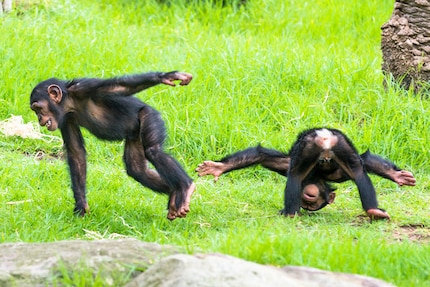
Background information
Project Half Marathon: fitness test causes cramp
by Oliver Fischer

Exercise and you’ll lose weight. Wrong! Although exercising is good for you, it doesn’t necessarily make you shed kilos. Why is that?
How many steps do you walk each day? 5,000 or 10,000? Fitness trackers or sports watches are made to measure every single one of them. The more, the better, right? After all, exercise makes you slim. Or does it? Unfortunately, Fitbit and the like aren't telling you the whole truth. What does science say?
Energy is essential in biology. Without it, everything would stop. No energy, no life. Let’s look at life as a metabolic process. If organisms – humans included – have enough energy at their disposal, it’s invested in reproduction. From an evolutionary point of view, natural selection seeks to get the most out of every calorie consumed. Therefore, systems that get the most out of energy are favoured. For this reason, many conclusions about the evolution of species can be drawn by studying these metabolic processes.
When it comes to humans, this is difficult because we’re so far removed from our ancestors who had to hunt for their food in the wild. That's why researchers are turning to indigenous peoples for answers. For example, the Hadza people in Tanzania. They’re one of the last peoples still living as hunter-gatherers. Their lives are physically demanding. Every morning, the women leave their villages to collect food such as roots. Some of them carry children on their backs. Hours are spent digging through the rocky soil with sticks. Meanwhile, the men go hunting with handmade bows and arrows, covering many kilometres every day. The children are the water carriers, lugging water to the village from the closest water point. In the late afternoon, everyone meets back at the village and cooks together.
Although this may sound romantic and decelerated to our ears, it is hard physical work. Hunting and gathering always bears the risk of not killing or finding anything. The men often walk several kilometres a day in the hope of catching something to eat. They consume several hundred calories a day in the process. While animals can rely on their strength and speed, humans must use other strategies to succeed. Cooperative foraging is what’s made us incredibly successful and helped us emerge from evolution as Homo sapiens and survive.

Scientist today still assume that indigenous peoples exposed to such high physical stress consume more energy than us village and city dwellers. The notion that obesity has to do with a lack of physical activity is still widespread. That’s why Duke University researcher Herman Pontzer and his team set out to measure the Hadza’s metabolism using doubly labelled water and urine samples. Upon Pontzer’s return from East Africa, the urine samples were analysed by a laboratory. Pontzer was astonished by the results of isotope mass spectrometry.
They revealed that the Hadza men burned about 2,600 kilocalories per day, while the women consumed about 1,900. So about the same as people in the United States or Europe. What’s more, the data didn’t change when different body sizes, fat percentage, age, or gender were taken into account.
The paradigm that increased physical activity results in higher calorie consumption has proven hard to bust.
Recent studies using doubly labelled water with traditional farmers in Guatemala, Gambia, and Bolivia showed that their energy expenditure was comparable to that of urban dwellers. In a study published in 2008, Amy Luke, a public health researcher at Loyola University in Chicago, took things a step further and compared the energy expenditure and physical activity of rural Nigerian women with that of African-American women in Chicago. Like the Hadza study, her study found no differences in daily energy expenditure between the two groups, despite large differences in activity levels. Following this work, Lara Dugas, also at Loyola College, and other researchers analysed data from 98 studies around the globe. It showed that people benefiting from the mod cons the developed world has to offer have similar energy expenditure to people in less developed countries with more physically demanding lives.
It’s a question that wouldn’t let Pontzer go. He measured the metabolism of primates living both in the wild and in captivity. Again, the result was that both groups metabolised about the same number of kilocalories per day. In 2013, Australian researchers also found similar energy expenditure in sheep and kangaroos kept in cages and allowed to roam freely. And in 2015, a Chinese team reported comparable energy consumption in giant pandas in the zoo and in the wild.
A study conducted with 300 participants involved them wearing accelerometers similar to Fitbit or other fitness trackers around the clock for a week. Their energy expenditure was measured with doubly labelled water. Pontzer found that the physical activity recorded by the trackers was only weakly linked to metabolism. On average, couch potatoes consumed about 200 calories less each day than people who were moderately active. Moderately active meaning people who take the stairs instead of the lift, for example. A surprising observation was that energy expenditure stagnated at a certain level in individuals with higher levels of physical activity. Even people with physically very demanding daily routines consumed the same number of calories each day as people with moderately active lives. The same phenomenon that equates Hadza energy consumption with other populations was also observed among the participants in this study.
How is this possible? How can the Hadza burn hundreds of calories when they’re out hunting and still turn over about the same amount per day as the average sedentary person in the United States or Europe? Could it be that the body is cutting corners elsewhere? For instance, saving calories by using less in other processes that also cost energy and thereby saving energy for physical activity? We know that exercise has anti-inflammatory effects and lowers levels of the reproductive hormone oestrogen. In lab mice, increased physical activity has no effect on daily energy expenditure. However, it does drastically reduce the number of ovulations and slows down wound healing. Lactating laboratory mice decrease milk production when their activity levels are high and have even been known to cannibalise their own offspring when under extreme conditions. When zebra finches are highly active, they reproduce later in life and increase the period between reproductive cycles. This points towards decreased metabolic activity in the reproductive system.
This evidence suggests that obesity is more a consequence of our gluttony and has little to do with our exercise patterns. So if our daily energy consumption has barely changed over the course of human history, the calories consumed are likely to blame. This also explains why exercise doesn’t make you slim. By no means is this an invitation to stop exercising and only focus on your diet. Doing sports is incredibly valuable for our body and does it the world of good. It increases the performance of our cardiovascular system, improves our brain functions and helps stay healthy and mobile as we get older.
Nevertheless, this raises questions that haven’t been answered. If our daily energy expenditure is roughly stable, how did humans evolve so radically different than their relatives the apes? Nothing in life is free. Resources are limited, so investing more in one feature automatically means investing less in another. So it’s no coincidence that rabbits breed rapidly but die young. All their energy is invested in their offspring.
Humans, on the other hand, are overriding this basic principle of evolution. Our brains are so big that reading this article requires you to invest the oxygen from every fourth breath you take to keep your brain working. And yet, humans have larger babies, reproduce more often, live longer, and are more physically active than all great apes.
Human beings are genetically and biologically so similar to other apes that researchers have long assumed our metabolism is also similar. But if energy expenditure is as limited as the Hadza study and others suggest, how could an inflexible, apelike metabolism process all the calories needed to support our costly human characteristics?

In their study of primates, Pontzer and his colleagues found that apes only metabolise half as many calories per day than other mammals. The primates' reduced metabolic rates were consistent with their slow growth and reproductive rates. Perhaps, conversely, faster reproduction and other characteristics of humans were associated with the evolution of an increased metabolic rate. What it took to test this idea were some chimpanzees, bonobos, orangutans and silverback gorillas. They needed to carefully drink doubly labelled water without spilling it and then give a few urine samples. In a scientific tour de force, Pontzer and his colleagues Steve Ross and Mary Brown, both of Chicago's Lincoln Park Zoo, worked with keepers and veterinarians from more than a dozen zoos across the U.S. to make it happen.
It took a few years, but they managed to gather enough data on ape energy consumption to make a solid comparison with humans. Indeed, humans consume more calories per day than any of our great ape relatives. Even taking into account the effects of body size, activity level and other factors, humans consume about 400 kilocalories more per day than chimpanzees and bonobos. The differences to gorillas and orangutans are even greater. These extra calories reflect the work our bodies put in to support bigger brains, produce more babies, and keep our bodies in shape so we live longer. It's not just that we eat more than other apes – although we do that too. As we know all too well, the accumulation of extra calories in our body that isn’t equipped to use them only leads to obesity. Our bodies have evolved all the way down to the cellular level to convert energy faster and do more than our ape relatives. Human evolution has not been without compromise. Our digestive system is smaller and less costly than in apes, who require a large, energetically expensive intestine to digest their fibrous, plant-based diet. But the crucial changes that make us human were driven by an evolutionary development of our metabolism.
So we can conclude: Total energy consumption appears to be limited. In turn, additional physical activity does not linearly increase energy consumption. Rather, it seems that the body, when under physical stress, conserves energy in other bodily functions.
Molecular and Muscular Biologist. Researcher at ETH Zurich. Strength athlete.
Interesting facts about products, behind-the-scenes looks at manufacturers and deep-dives on interesting people.
Show all
Background information
by Oliver Fischer

Background information
by Patrick Bardelli

Background information
by Claudio Viecelli